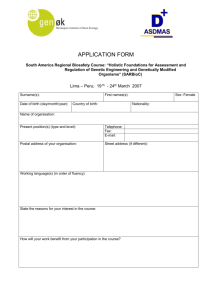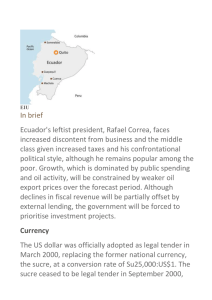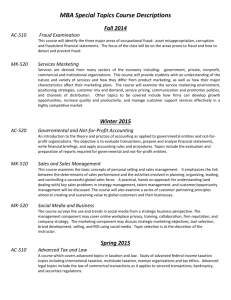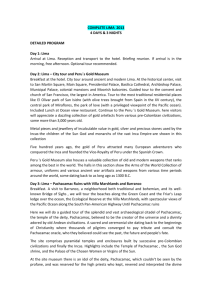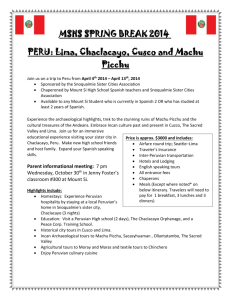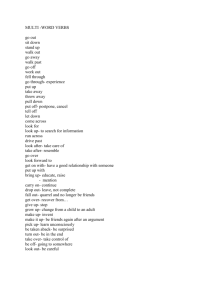Packing and Traveling Back to Top
advertisement
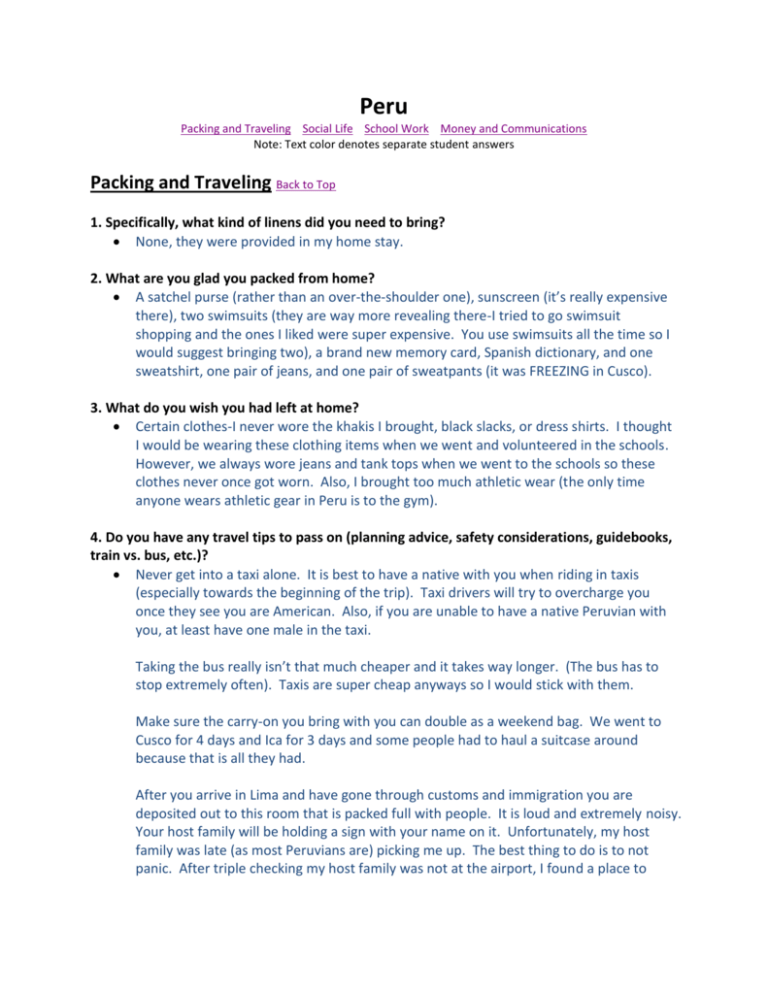
Peru Packing and Traveling Social Life School Work Money and Communications Note: Text color denotes separate student answers Packing and Traveling Back to Top 1. Specifically, what kind of linens did you need to bring? None, they were provided in my home stay. 2. What are you glad you packed from home? A satchel purse (rather than an over-the-shoulder one), sunscreen (it’s really expensive there), two swimsuits (they are way more revealing there-I tried to go swimsuit shopping and the ones I liked were super expensive. You use swimsuits all the time so I would suggest bringing two), a brand new memory card, Spanish dictionary, and one sweatshirt, one pair of jeans, and one pair of sweatpants (it was FREEZING in Cusco). 3. What do you wish you had left at home? Certain clothes-I never wore the khakis I brought, black slacks, or dress shirts. I thought I would be wearing these clothing items when we went and volunteered in the schools. However, we always wore jeans and tank tops when we went to the schools so these clothes never once got worn. Also, I brought too much athletic wear (the only time anyone wears athletic gear in Peru is to the gym). 4. Do you have any travel tips to pass on (planning advice, safety considerations, guidebooks, train vs. bus, etc.)? Never get into a taxi alone. It is best to have a native with you when riding in taxis (especially towards the beginning of the trip). Taxi drivers will try to overcharge you once they see you are American. Also, if you are unable to have a native Peruvian with you, at least have one male in the taxi. Taking the bus really isn’t that much cheaper and it takes way longer. (The bus has to stop extremely often). Taxis are super cheap anyways so I would stick with them. Make sure the carry-on you bring with you can double as a weekend bag. We went to Cusco for 4 days and Ica for 3 days and some people had to haul a suitcase around because that is all they had. After you arrive in Lima and have gone through customs and immigration you are deposited out to this room that is packed full with people. It is loud and extremely noisy. Your host family will be holding a sign with your name on it. Unfortunately, my host family was late (as most Peruvians are) picking me up. The best thing to do is to not panic. After triple checking my host family was not at the airport, I found a place to stand near the entrance where people come in. Eventually, Dr. Aviles (the professor from UNK who went with us to Peru) was able to find me. 5. What places would you advise future students to see and why? I would definitely advise going to Iquitos (the jungle). Our group also went to Arequipa because we heard that Colca Canyon was awesome. However, the best part of that trip was our White River Rafting Excursion which we could have done way closer to Lima. Arequipa was fun, but if you only have limited time and a limited budget I would skip it. Walking around Miraflores and Barranco (especially at night) is tons of fun (and it’s free). Within Miraflores is where the Indian Market is. This is a great place to get authentic (cheap) souvenirs for friends and family. Also, I would be sure to go to the center of Lima. Going to Cusco and Machu Picchu were included in our trip. If they are not in yours BE SURE TO GO. It was absolutely amazing. I would advise the students to visit the national museum in Lima. It was amazing and I learned a lot. For a side trip I definitely advise them to take a trip to Puno to see Lake Titicaca. I would definitely advise going to church at the cathedral in the center of Lima. Social Life Back to Top 1. How did you meet other students? When we arrived at UPC in January it was actually summer there and consequently, campus was deserted. It was really hard to meet people at first. We got really luckily and the first Thursday after class all the UNK students decided to play soccer together. There were actually students on the courts playing and those were the first friends we made. Also, a lot of students had host brothers/sisters that were students at UPC. This was awesome because if they invited you to some social outing they would also invite some of their friends from UPC so then you were constantly meeting new people. 2. How did you like to spend your free time and why? Is there anything you regret not doing more of in your free time? At first I spent a lot of my free time cooped up in my room missing my life at UNK. This was the worst decision I could have made. Eventually, I decided it was time to branch out and began hanging around on campus after class and walking around POLO (a little mall) with other UNK students. It was super hard at first, but you just have to put yourself out there and embrace the experience. Don’t miss home too much because it will be waiting for you in four months! Also, I spent a lot of my free time with my host family. Looking back, I feel like this was an AWESOME decision. I was constantly speaking Spanish and they were always taking me to see new parts of the Peru. I also attended a lot of family get-togethers which I also think was an excellent decision. It allowed me to learn more of the culture and get to know my host family better. Now, I still am in constant contact with my family which is awesome knowing that I have amazing people in a foreign country ready to welcome me when I return. ***I would advise students to spend the least amount of time possible on Facebook or Skype or cooped up in there room. There are so many things to do in Lima (it is a city of 10 million!!!) Just walking around Miraflores or Lima was also a fun time! 3. What opportunities for social, recreational, and cultural events that the host university or program offered did you like best? Why? I loved both the trips the university organized for us. It was super fun to see a new part of Peru and to see one of the Seven Wonders of the World. Also, for each class we took we went on a mini, one-day field trip. These were super fun because I was able to learn a lot more about the culture. (We went to a play, the “Real Felipe” museum, “Las Huacas”, and the United States Embassy.) Also, students from UPC volunteered twice a week at an English conversation table specially made for the UNK students. These conversation tables served as a great way to meet students. I thought the school visits to the high schools that UPC organized were really fun (however, I am an education major). All the teachers and faculty at both the high schools we went to were extremely nice and welcoming. It was really fun to be able to see how schools work in Lima. 4. What piece of advice would you give future students regarding their non-academic life while abroad? Go out and do something every night during the weekends. Do not stay at home Skyping people from back home. Go to the discos, walk around the park, and spend the evening with your host family. Also, if you are with a group of UNK students, try to talk in Spanish as much as possible. School Work Back to Top 1. How did your academic experience abroad differ from your U.S. experiences concerning: Relations with professors/classroom instruction? The relationships I held with my professors was very similar to my relationships with my professors at UNK. All of my UPC professors were extremely kind, nice, and welcoming. If I ever had any type of question, they were always willing to help me. Classes last three hours (with one fifteen minutes break); however, you will only have each class once a week. Teachers do not have their students buy textbooks for the class-the instructor prints off any needed materials. My three classes were a lot more laid-back and discussion-based. Grading? Grades are based on a scale of 1-20, with 20 being the best. Anywhere between a 15 to 20 is an “A”; anything below a 12 means you failed the class. You will still receive a number for your grade; however, the number will be converted to a letter grade on your UNK transcript. Study habits? We had a lot more group projects so I was working with others a lot more. Library? The library was HUGE. It had 8 floors. I used the 6th floor the most often because it had cubicles that held four people. This is where I typically worked on group projects. At the beginning of the semester it was easier to find an open cubicle (because it is summer and no UPC students are on campus). However, once school hits there are no open cubicles. You must reserve a cubicle either online or in-person in advance. The library/campus had WI-FI. Computer access? I mostly used the wireless in my home stay. I would say having a laptop is a must. There is WIFI on campus in the classrooms. A lot of students lived a fifteen minutes plus walking distance from the school. Therefore, it was very time-consuming and inconvenient to constantly have to go to school in order to have computer access. Also, it is dangerous to walk alone at night so that would limit your computer time. A lot of us spent time in Starbucks on our computers. Money and Communications Back to Top 1. How much money in U.S. currency would you recommend students have at their disposal for their whole time abroad? I would recommend bringing no more than $100 dollars of U.S. currency. I brought two credit cards in case I lost one because it takes a while to receive mail at home. (Also, their mailing system is TERRIBLE. If you receive a package, the persons whose name is on the package must be present with their passport. Your host mom (or any family member) cannot take a package for you. The mailman normally came in the afternoon when we had class. All three times I received a package; I was in class when the mailman came. I then had to take the hour or so trip to the post office. Go through three to five different extremely long lines before finally being able to pick up my package.) 2. How much money did you have in foreign currency when you left for your program? Was it enough? None, I simply used the ATM on campus and withdrew money after arriving. 3. How did you manage your money (credit cards, traveler’s checks, bank accounts etc.)? How and where did you access your money? I used a debit card to get money out of ATM’s. I used online banking to manage my checking and savings accounts. Do not bring any traveler’s checks because no one accepts them. I would suggest only withdrawing Peruvian currency from ATMs. (If you withdraw U.S. money then you already get charged with a foreign transaction fee on top of a fee to change the U.S. money to Peruvian currency.) 4. How much money did you spend on: Books? $30 School Supplies? $0 Food? $200 Local transportation? $90 Travel? $400 Personal items (toiletries)? $15 Entertainment? $50 Postage? $10 Airfare? $1,200 Laundry? $0 5. How did you communicate with the U.S.? What would you recommend to future students (e.g. calling card, set up e-mail account and where, etc.)? I used mostly e-mail/Facebook /Skype to communicate with family and friends. I would not suggest buying calling cards because you won’t use them. Also, while in Peru I bought a super cheap (40 sole) track phone that came with 20 minutes. All UNK students ended up getting a track phone in Peru. It was way easier to communicate and it came in handy for safety reasons. It costs 1 sole for every minute you add to your phone which is super cheap. Comments - School supplies like notebooks/folders can be hard to find and/or expensive, so bring them from home if you have room in your suitcase. Bring peanut butter because the “real stuff” is hard to find and very expensive because it’s imported. -Buy more souvenirs than you think you need. I got home and started distributing everything I had bought and I definitely thought I had bought more than I really did. -You really don’t need to bring that much American cash with you. Once you arrive in Lima, your host family will pick you up and take care of you that night. The next day you will go to UPC and receive a tour. Within UPC are 4 to 6 ATM’s where you can put in your credit card and it will give you soles (Peru’s currency). (Some people brought tons of American money with them and then exchanged that directly to soles but they were charged a pretty high fee.) I brought a ton of cash with me and ended up having to stash it in a secret place for the entire semester. Also, make sure to get a credit card that doesn’t have a huge foreign transaction fee. The credit card I brought let me have 3 free foreign transactions fees a month, which was great because I typically only withdrew money twice a month. Some people were not as lucky as me and were charged $6.50 every time they withdrew money. When you do decide to withdraw money, choose the highest amount. You will go through the money fast and you don’t want to constantly withdraw money because of all the fees you get charged when you do. -Take as many pictures as possible. I didn’t end up taking any pictures of Vivanda’s (the grocery store) or little places like that and I regret it now. -Keep a blog and write in it as often as possible. It is a great way to communicate with a ton of people at once. Once I got back in America, I made my blog into a book and I absolutely LOVE looking at it. -Keep all the little mementos (train tickets, receipts etc.) and write down any funny quotes.
